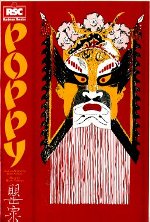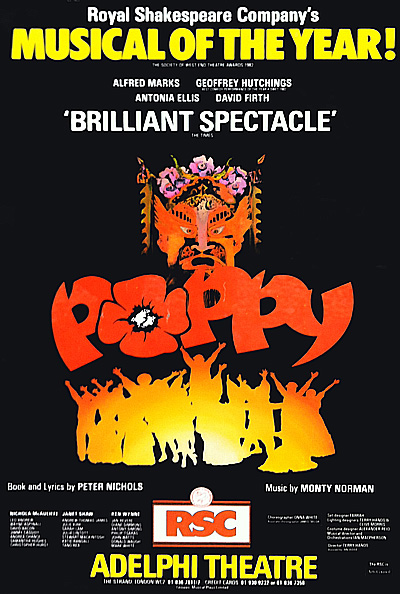
Poppy, a pantomime parody which explores British imperialism and the nineteenth-century opium wars, was first staged by the Royal Shakespeare Company in 1982. It won the S.W.E.T. award for Musical of the Year and was later re-mounted at the Adelphi. In 1988 the show was revived in a new version at the Half Moon Theatre and that is the text available here.
Poppy is a celebration of Victorian values and exposes the hypocrisy, racism, drug dealing, money worship and sexual repression of the time through its favourite entertainment form. Dick Whittington, his man Jack, Sally the Principal Girl, the Dame, two pantomime horses, a flying ballet, a transformation scene and even the traditional song-sheet are all brought on to tell the serious and finally devastating story of the single most profitable crop of the British East India Company.
Monty Norman's exuberant score, for an orchestra of six, is vibrant, tuneful and ironically arousing.
The year is 1840. The Emperor of China warns the young Queen Victoria to know her place - "The Emperor's Greeting". The scene is set, panto-style, in a quaint, cardboard English village, "Dunroamin-on-the-Down", ancestral home of Sir Richard (Dick) Whittington and his widowed mother Lady Dodo.
Dick sets off with his manservant Jack Idle and the men of the village to seek their fortune in London or in the new towns of the Industrial Revolution. Jack is sad to leave his girlfriend, Sally. His horse Randy and her mare Cherry also fancy each other and have to be rebuked for their friskiness - "Whoa, Boy". Lady Dodo pines for the good old days, but Dick believes the age of gold is yet to come.
Sally, left with her mare, sings of her confusion. She likes Jack but pines for Sir Richard, who is also her legal guardian. Secretly, she and Dodo take off on their own for London.
In the City, Dick encounters Obadiah Upward, an up-and-coming merchant, who explains how their fortunes can be made in distant China from the sale of poppies. Dodo and Sally arrive and they agree to make the journey.
They sail to India, and, in the poppy fields, Dodo tells Upward why she loves him - "Nostalgie de la Boue". Dick and Jack reflect on British India, the East India Company and the Battle of Plassey in a Kipling-esque ballad - "John Companee"
En route for China aboard one of Upward's opium clippers, Dick persuades Jack and Sally to sample their wares, and they savour a pipe dream of paradise.
The Emperor of China tells Victoria to stop the cultivation of poppies, but she replies that the "Bounty of the Earth" is to be shared by every nation. She leaves him alone to lament his son's addiction to the drug. He sends Commissioner Lin to Canton to stamp out the trade. Here, Lin meets Viceroy Teng and his daughter Yoyo who is confused by Europeans - "They All Look the Same To Us".
Obadiah refuses to be intimidated by Lin's threats and sends Dick up the coast to seek fresh markets. Victoria joins his crew as an interpreter and Christian missionary and is questioned on her religious scruples. She explains there is a blessed trinity that justifies trade - "Blessed Trinity" (of Civilisation, Commerce and Christianity).
Before they leave, Dodo guesses that Sally loves Dick and tells her he is not only her guardian but also her half-brother.
The Chinese lay siege to the European compound, and the animals have to be slaughtered for food. Jack sings Randy a last lullaby before killing him - "Rock-A-Bye Randy"
In the war that follows, the Chinese are defeated and surrender Hong Kong Island. Dodo and Upward sing of how the British and French soldiers sacked the Imperial Summer Palace in Peking - "Rat-a-Tat-Tat".
Though there are dark and savage undertones to this fairy tale, in the end, most of the British live happily ever after, and it is the Chinese who learn to know their place.
Poppy premiered on 25 September 1982 at the Barbican Centre performed by the Royal Shakespeare Company. That year, it won the Laurence Olivier Award for best new musical. On 14 November 1983, the play was moved to the Adelphi Theatre and ran until 18 February 1984. The show was revived in December 1988 at the now-closed Half Moon Theatre (with Louise Gold as Dick Whittington), in 1998 by the Chelsea Players, and again in March 2005 by the Italia Conti Academy at the Landor Theatre.
A 'script-in-hand' performance was given as part of the Royal Shakespeare Company's 50th Birthday Celebrations on 9 July 2011, directed by Mark Ravenhill, with both Peter Nichols and Monty Norman in the audience.
Act One
• "The Emperor's Greeting"
• "Dunroamin-on-the-Down"
• "Whoa, Boy"
• "The Good Old Days"
• "Why Must I?"
• "In These Chambers"
• "If You Want to Make a Killing"
• "Nostalgie de la Boue"
• "John Companee"
• "Poppy"
Act Two
• "China Clipper"
• "The Bounty of the Earth"
• "The Emperor's Lament"
• "China Sequence"
• "They All Look the Same To Us"
• "The Blessed Trinity" (Civilisation, Commerce and Christianity)
• "Sir Richard's Song"
• "Rock-A-Bye Randy"
• "The Dragon Dance"
• "Rat-a-Tat-Tat"
• "Finale"
Aucun dossier informatif complémentaire concernant Poppy
Aucun dossier informatif complémentaire concernant Poppy

Version 1
Poppy (1982-09-Barbican Theatre-London)
Type de série: OriginalThéâtre: Barbican (Londres - Angleterre) Salle : TheatreDurée : Nombre : Première Preview : Inconnu
Première: 25 September 1982
Dernière: InconnuMise en scène : Terry Hands • Chorégraphie : David Toguri • Producteur : Star(s) : Avec: Roger Allam (Lin Tse-Tsi), Jane Carr (Queen Victoria), Tony Church (Tao-Kuan), Stephen Moore (Jack Idle), Julia Hills (Sally Forth), Geoffrey Hutchings (Lady Dodo), Bernard Lloyd (Obadiah Upward), Michael Gyngell, Susan Jane Tanner, David Whitaker, Christopher Hurst, Andrew Thomas-JamesCommentaires : A revised and re-written version opened at the Adelphi in November 1983.

Version 2
Poppy (1983-11-Adelphi Theatre-London)
Type de série: RevivalThéâtre: Adelphi Theatre (Londres - Angleterre) Durée : 2 mois 2 semaines Nombre : 97 représentationsPremière Preview : 14 November 1983
Première: 22 November 1983
Dernière: 04 February 1984Mise en scène : Terry Hands • Ian Judge • Chorégraphie : Aucun • Producteur : Star(s) : Avec: Cherry the Mare ·Andrea Chance
Cherry the Mare · Samantha Hughes / Chinese Dancer · Samantha Hughes / Chorus · Andrea Chance / Chorus · Andrew Thomas James
Chorus · Julie Kirk / Chorus · Julia Lintott / Chorus · Katie Randall / Chorus · Diane Simmons / Chorus · Donald Waugh / Clerk · Leo Andrew / Clerk · Jimmy Cassidy / Clerk · Stewart Mackintosh / Clerk ·Tano Rea / Dick Whittington · Antonio Ellis / Elephant; Chorus · Antony Simons / Elephant; Chorus · Mark White / Jack Idle · David Firth / Lady Dodo · Geoffrey Hutchings / Lin Tse-Tsii · John Watts / Lord Palmerston · Mark White / Obadiah Upward · Alfred Marks / Queen Victoria · Nichola McAuliffe / Randy the Horse · Christopher Hurst / Randy the Horse · Andrew Thomas James / Sally Forth · Janet Shaw / Swing · Wayne Aspinall / Swing · Jan Revere / Tao-Kuan · Ken Wynne / Teng Tin Chen · David Bacon / Tiger; Chorus · Philip Tsaras /
Yo-Yo; Chorus · Sarah LamCommentaires : This was a revised and re-staged version of the original production at the Barbican, September 1982. It had undergone rather a lot of changes - possibly to make it more acceptable for a planned Broadway transfer - but this time round it received a critical drubbing, including: “It collapses amidst the stuffing and garnishing of a cumbersome, shamefully under-rehearsed and embarrassingly under-cast production”
Pas encore de video disponible pour ce spectacle